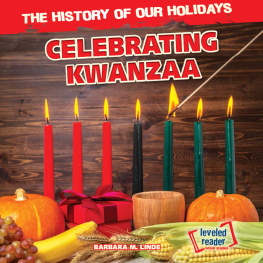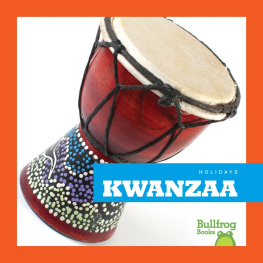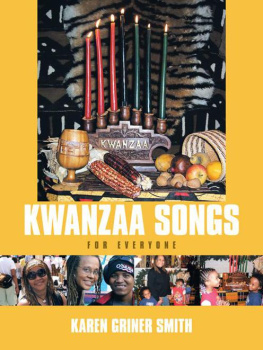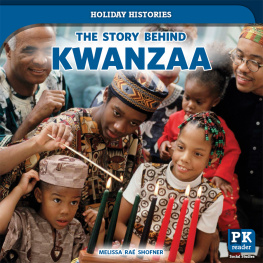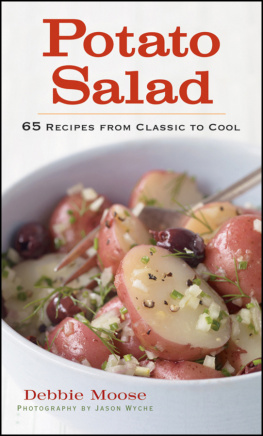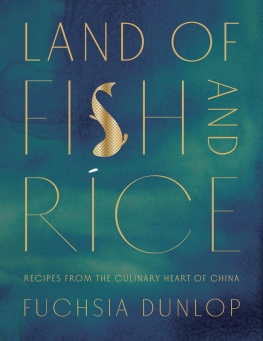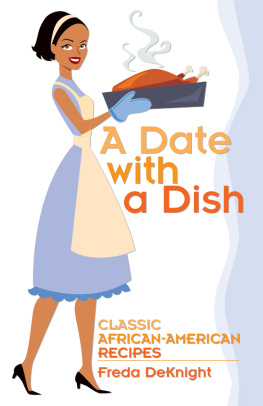Fruits of the Harvest
R ECIPES TO C ELEBRATE K WANZAA
AND O THER H OLIDAYS
Eric V. Copage

To my father, John E. Copage,
who encourased me to dream.
To my children, Evan and Siobhn,
for their prosperous future.
And to those of African descent
around the world and throughout history.
CONTENTS
Before eating, open your mouth.
Proverb, Mauritania
I was never a holiday kind of guy. Perhaps it was because we observed few holiday rituals of any kind. Although we put up a Christmas tree every year, there was no ceremony to itno drinking of eggnog or listening to carols while hanging ornaments. To me the tree seemed more or less like another piece of furniture. Over the past few years, however, the holiday season has taken on a new meaning for me as my family sits at the dinner table the week following Christmas to celebrate Kwanzaa.
This cultural observance for black Americans and others of African descent was created in 1966 by Maulana (Ron) Karenga, who is currently chairman of black studies at California State University in Long Beach. Kwanzaa means first fruits of the harvest in Swahili, but there is no festival of that name in any African society. Karenga chose Swahili, the lingua franca of much of East Africa, to emphasize that black Americans come from many parts of Africa. Karenga synthesized elements from many African harvest festivals to create a unique celebration that is now observed in some way by more than 5 million Americans.
When I first told my wife I was thinking about observing Kwanzaa, she barred the way to our attic and said shed never chuck our Christmas tree lights and antique ornaments. I told her that wouldnt be necessary. Kwanzaa, which runs from December 26 to New Years Day, does not replace Christmas and is not a religious holiday. (We now celebrate both.) It is a time to focus on Africa and African-inspired culture and to reinforce a value system that goes back for generations.
Like many people, I was introduced to Kwanzaa by chance, in late December a few years back. I was visiting the American Museum of Natural History when I heard the sibilant sound of African rattles. It was coming from a dance performance, part of the Kwanzaa celebration that has been held annually at the museum since 1978. The holiday didnt make much of an impression on me then, but I returned to it after the birth of my son, Evan, in 1987.
I wanted Evan to have a three-dimensional sense of his African heritage. I wanted him to experience the pride of learning about the sublime Russian poet Aleksander Pushkin, the extraordinary American composer Duke Ellington, and Alexandre Dumas, author of The Three Musketeers. I wanted Evan to learn about the West African medieval empiresSonghai, Mali, and Ghanaand about the African explorers such as Esteban, who traveled throughout what is now Arizona and New Mexico in the sixteenth century, and about inventors like the mechanical engineer Elijah McCoy (who was the original real McCoy). I wanted him to understand that through tenacity, hard work, and purposefulnessall of which are grounded in the African and African-American ethosblacks have flourished as well as survived. I wanted to train Evan to look for opportunity, and to prepare for it. And I wanted to have a forum for showing him examples of past successes, and for showing him that those people inevitably gave back to the black community in particular and to the general community in which they lived.
But how to do this? I could have made up some ritual. But then wed miss the communal aspect, the idea that in households similar to ours people were involved in similar activities. Wed miss one of the major reasons for celebrating a cultural holiday, the hoped-for metaphysical bonding with other African-Americans.
There is Black History Month, of course, which Ive always enjoyed. I look forward to being enveloped for four weeks in the membrane of black accomplishment as it comes to me from special radio and television programs and is represented in the special displays in bookstores. But this Gatling gun approach to black culture, laudable as it is, seems to lack focus. And unlike other long observancesLent, for instance, or RamadanBlack History Month has no agreed-upon ritual, structure, or climax.
I thought about my goals for Evan and decided that Kwanzaa was the best lens through which to view the landscape of the African diaspora and the lessons it has to teach. Because it is only one week long, and because of the ceremony, and because it climaxes with a glorious feast, Kwanzaa has an intensity and focus that provides the perfect atmosphere for my son to experience the joys of being black.
Kwanzaa also has the celebratory aspect that will provide memories for Evan and now my daughter, Siobhan, to savor as adults and to pass on to their children.
If you want to adhere strictly to the Kwanzaa program as Karenga conceived it, here is what you need to have and what they mean:
Mazao: fruits and vegetables, which stand for the product of unified effort.
Mkeka: a straw place mat, which represents the reverence for tradition.
Vlbunzi: an ear of corn for each child in the family.
Zawadi: simple gifts, preferably related to education or to things African or African-influenced.
Klkombe cha umoja: a communal cup for the libation (I like to look at this as a kind of homage to past, present, and future black Americans).
Kinara: a seven-branched candleholder, which symbolizes the continent and peoples of Africa.
Mishumaa saba: the seven candles, each one symbolizing one of the Nguzo Saba, or seven principles, that black Americans should live by on a daily basis and which are reinforced during Kwanzaa.
On each day of Kwanzaa, a family member lights a candle, then discusses one of those seven principles. The principles, along with Karengas elucidation of them in 1965, are:
Umoja (Unity): To strive for and maintain unity in the family, community, nation, and race.
Kujichagulia (Self-determination): To define ourselves, name ourselves, create for ourselves, and speak for ourselves instead of being defined, named, created for, and spoken for by others.
Ujima (Collective Work and Responsibility): To build and maintain our community together, and to make our sisters and brothers problems our problems and to solve them together.
Ujamaa (Cooperative Economics): To build and maintain our own stores, shops, and other businesses and to profit from them together.
Nia (Purpose): To make our collective vocation the building and developing of our community in order to restore our people to their traditional greatness.
Kuumba (Creativity): To do always as much as we can, in whatever way we can, in order to leave our community more beautiful and beneficial than we inherited it.
Imani (Faith): To believe with all our heart in our people, our parents, our teachers, our leaders, and in the righteousness and victory of our struggle.
The next-to-last day of the holiday, December 31, is marked by a lavish feast, the Kwanzaa Karamu, which, in keeping with the theme of black unity, may draw on the cuisines of the Caribbean, Africa, South America wherever Africans were taken. In addition to food, the Karamu is an opportunity for a confetti storm of cultural expression: dance and music, readings, remembrances. Here is Karengas suggested way of conducting a Karamu as enlarged upon by Cedric McClester:
Next page

